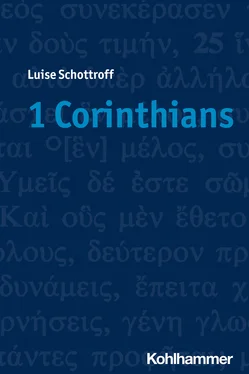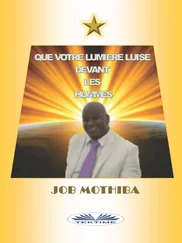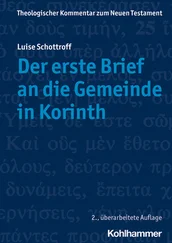3:23Our slavery is over, we belong to Christ and thus to God. In the final word of this hymn of triumph—God—sound forth both the Shema Israel (see 8:6; cf. Deut 6:4) and the consummation, when all the powers are brought into subjection and »God is all in all« (15:25–28). It is the work of the one God that the healing of the world can already be experienced: in humanity’s communion with the Messiah.
1 You should evaluate us in this way: We are serving the Messiah, and to us has been entrusted responsibility for the divine mysteries. 2 Now, those entrusted with a responsibility must be trustworthy. 3 For me, it is not decisive if I am judged by you or any human court as it deliberates. Nor do I render a judgment about myself. 4 I am not aware of being guilty of anything, but that does not yet mean I have been declared innocent. The Eternal One alone judges me. 5 Therefore do not judge prematurely, before the Eternal One comes, who will bathe in the light what has been hidden by the darkness and reveal the purpose of the hearts. Then all will receive their acknowledgment from God.
6 For your sakes, sisters and brothers, I have made all that clear by applying it to myself and Apollos, so that through us you learn that this principal applies, »Nothing beyond the Scripture.« Then you won’t play the one side against the other, promoting your self-importance. 7 For who is making you so special? What do you have that you have not received? Since you received it as a gift, why are you selling your self-importance, as though you had not received it as a gift? 8 Are you really already full? Are you already rich? Have you, apart from us, already attained regal honor? If only that were true. Then we could share in your regal honor. 9 But it appears to me that God has put us ambassadors at the very end of the procession in the arena, in the place of those who have been condemned to die. We end up a spectacle for the world, for angels and mortals. 10 We have become fools for the Messiah’s sake. And what about you? Are you Christ’s clever ones? We are weak, and you, are you strong? Are you esteemed? We are despised. 11 To this very hour we are suffering hunger and thirst, we run around in rags, we are getting beaten up, and we are homeless. 12 We are working hard with our own hands; when we are reviled, we bless; when we are persecuted, we see it through. 13 When we are slandered, we cheerfully set things straight. We have become like the scum of the earth, dregs in people’s eyes, until this very day!
Paul follows the praise of the body of Christ in 3:21b–23 with sober thoughts about the competence of the congregation in legal matters. The congregation possesses judicial competence (cf. 2:15; see on 6:1; 5:1–13), but it has clear boundaries when it comes to decisions that God alone will make. Thus, the congregation can pass judgment on people who are commissioned by God to teach, prophesy, etc., but the congregation must continue to be aware of the limited nature of its judgment. The interpretive history of this passage is burdened by the frequent presupposition that in Corinth Paul was dealing with opponents whom he vehemently opposed (in 4:3, for example).
4:1gives the theme for the brief section (4:1–5): The issue is the congregation’s evaluation of the work of people like Paul and Apollos. It is possible that the word Paul chose ( anthrōpos ): »A person (or human)/ anthrōpos should think of/evaluate …« is meant to point to the difference between divine and human judgment (cf. 4:3, 5). In the translation above, I have decided in favor of an interpretation in which Paul is thinking about the congregation and therefore chose the plural: »You [pl.] should evaluate us in this way ….« The subject of the evaluation can only be the work done at the behest of the Messiah. For himself and others, therefore, Paul points to the commission: to serve the Messiah and to deal responsibly with God’s secrets (on this see at 2:7).
4:2That means that the evaluation can deal only with the trustworthiness with which the Messianic commission is fulfilled.
4:3Paul would like to call the criteria to mind. The congregation has a right to judge him, but his salvation does not depend on what they decide, because the verdict is rendered by a human court [Literally, a human day—Trans.]. The concept of a human day of judgment/ anthrōpinē hēmera is probably an ad hoc neologism based on biblical language about the day (of judgment), but it does not refer to judicial proceedings before municipal or Roman authorities (such as those in Acts 18:12–17). Here the concept refers to a congregational assembly and makes clear the distinction between its judgment and God’s. Is 4:3 meant to disparage their judgment? One can read the sentence this way, but also quite differently: Paul wants to clarify the criteria. The issue is evaluation by humans (not by God), be it by the congregation or another human court, be it he himself doing it through self-examination, something he rejects. What that produces, according to 4:4,is the impression of being aware of no guilt. The result of such alleged self-examination has no relevance for the question of whether he is righteous in the sight of God. Of that, God alone is judge.
In 4:5criticism of what’s been going on in the congregation emerges. In the congregation, there could be people who proleptically arrogate to themselves God’s judgment with respect to Paul, Apollos and people like them. It could be that that relates to the competence of the congregation to render a judgment about people battling one another; indeed, Paul returns to these rivalries in 4:6–7.
4:5b says that God’s judgmentmakes things right: Everything that is hidden will be brought to light, and God encounters the truth about every single person. The »purpose of the hearts« stands for the person as a whole and encompasses the mind, decision-making, desire and trust. 182The »reward« for what one does in life (3:8, 14) is God’s approval. Here, as well as in 3:14–15, God’s judgment is not depicted as a punitive event but as a place of ultimate salvation. In the formulations »the things now hidden in darkness« and the »plans/desire/purposes of the heart,« Paul is varying biblical language. 183
4:1–5 makes clear the significance of the comprehensive justice of God’s judgment for our life-together in the present: Where people lose the proper criteria, that is where God’s future judgment sets necessary limits. 4:1–5 is not all-purpose instruction, but a protest evoked by what’s been stated: the accommodation to the »world’s« power-structures that is going on within the congregation.
This section begins with a concluding argument against the profiling and rivalry that Paul rejects for the congregation, since they are the power structures that characterize the world (4:6–7). In 4:8–13 he sets in opposition to these structures a different image, that of a congregation that shares a common fate with those who are the least in society and is in solidarity with them. These least ones can be seen when the festive processions enter the circus or the amphitheater. Within the processions are people about whom the spectators—and they themselves—already know that their death is planned for the hours to come, all to please the crowd.
4:6The assertion, surfacing again and again in the history of interpretation, that there was a controversial relationship between Paul and Apollos, has no basis in the Pauline texts themselves. In view of 4:6, it is absurd. He says here that he has regarded the relationship between the two as an alternative to controversy and presented it in just that way. In this context, »Do not resist Scripture« refers primarily to Jer 9:22–23 [Eng. Bible, 9:23–24](see 1:29–31), since from this text he repeatedly (1:29, 31; 3:21), as also in 4:7, takes up the key word kauchasthai /be arrogant/boast. Jer 9:22–23 [Eng. Bible, 9:23–24] reads: »Do not let the wise boast in their wisdom, do not let the mighty boast in their might, do not let the wealthy boast in their riches; but let those who boast boast in this: to comprehend and recognize me, that I, namely God, bring about steadfast love, justice, and righteousness in the earth, …« For Paul, this text is a kind of red thread that runs through the discussion of the competitive structures: people gain power not by using their superiority against one another but by living in a mutuality that grows out of the nearness of God (see above on 1:29–31). But Paul here is also basically going beyond the reference to Jer 9:22–23 [Eng. Bible, 9:23–24]: Scripture, interpreted and lived in that same mutuality, is the source and measure of learning. 184To this, he and Apollos have held fast.
Читать дальше












